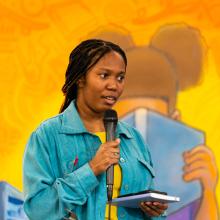
Memphis Washington
Tell us about your work/ research. What kinds of things do you do?
My undergraduate studies centered around hydrology, climatology, and geology. In these studies, I have used GIS technologies to quantify and visualize changes in coastal geomorphology, climate systems, vegetation, and coastlines.
What sparked your initial interest in your career?
I'm at the very start of the nascent phase of my career. My motivation to continue in the environmental sciences, especially oceanography, is fostered by research scientists I learned from through both school and internships. My interest in oceanography was especially fostered by interning with Dr. Vicki Ferrini's data collaboratory and supporting the SeaBed 2030 project through that time. I have a lot to learn and feel optimistic that I can find a productive niche in this community.
Who influenced you or encouraged you the most?
I was encouraged by faculty in my department to seek out new experiences and explore the environmental sciences. I am also the beneficiary of very clear and honest guidance with each of those experiences.
What element of your work/ study do you think is the most fascinating?
"My work" is too grand a phrase for where I am in my career path. However, I enjoyed cleaning multibeam echosounder data so much that I applied to OET's SEIP.
How did you get involved with Ocean Exploration Trust? How did you become part of the expedition team?
I applied to the SEIP after learning more about the program while at AGU23 Conference from a collection of researchers including Dr. Vicki Ferrini and Dr. John R. Delaney.
What other jobs led you to your current career?
I have a background working for a community bookshop as a programs facilitator for all ages, which included creating, managing, and facilitating book clubs for kids, teens, and adults; virtual and outdoor environmental educational programs for elementary-aged youth; urban forest clean-ups; mini-literary festivals for kids; and more! Concurrent to that I had a number of internships that broadly touched upon "environmental science" with organizations that include the NYC Parks Department, NYC Mayor's Office of Environmental Remediation, the Natural Areas Conservancy, and the Columbia Climate School with Dr. Vicki Ferrini.
What are your degrees and certifications?
Bachelor of Science in Environmental Earth Systems Science - The City College of New York 2024
What are your hobbies?
I am a leisure writer and I host a weekly virtual writing group. I also cook and bake for fun. Currently, I am learning to crochet!
What advice would you give someone who wants to have a career like yours?
If there is a high schooler reading this, my advice is to try a lot of things! When I first applied to college, I told the school I was going to study ethnomusicology. I was very passionate about it; I took a gap year and (among other things) set up a conversation series that was going to be the center of my senior thesis. Throughout that time, I also spent time interning with literary organizations like publishers and poetry festivals. However, when I got to college I pivoted to the environmental sciences, inspired by the urgency and sensibility of the field. All the while, I continued to pursue a broad range of interests and helped organize reproductive justice and queer conferences, worked at art museums, volunteered and worked at bookstores, and got involved in my community in uptown NYC. While it took time for me to concentrate on climatology and hydrology with the steadfastness I have now. I have benefitted both personally and professionally from pursuing diverse interests and maintaining hobbies and connections outside of the sciences during my studies. These pursuits have made my life richer and more enjoyable while studying full-time. I encourage you to also pursue interests outside of your declared field of study; it's life-saving.
What excites me most is the opportunity to learn directly from practicing experts, both in seafloor mapping and all the rest of the scientific and other focuses represented on this mission.
